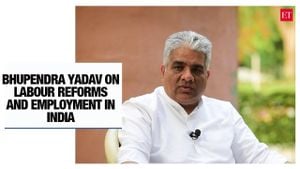Cricket fans have their eyes firmly set on the upcoming ICC Champions Trophy 2025, scheduled to take place on home soil for Pakistan. Yet, looming concerns about the participation of India's national cricket team are casting shadows over the event, igniting feverish debate and disappointment across the cricketing community.
Shahid Afridi, the former all-rounder for Pakistan's national team, has made headlines with his fervent plea for unity between cricketing rivals. He urged both the Board of Control for Cricket in India (BCCI) and the Pakistan Cricket Board (PCB) to put aside their differences and come together for the good of the sport. Afridi's sentiments echo across the cricketing world: "Cricket is at a crossroads, facing perhaps one of its greatest challenges. Now is the time to put differences aside and let the game unite us," he wrote on social media platform X.
The ICC Champions Trophy 2025 marks its return after a significant hiatus, with excitement breaching national borders. Africa last hosted the tournament back in 2017, and fans have been eagerly anticipating its revival. But with the government of India yet to grant permission for its cricket team to play on Pakistani soil, the situation has taken on new dimensions. Instead, discussions around holding matches at neutral venues like the UAE are muddling the planning process.
The BCCI's refusal seems to have emerged from insights provided by the Indian government. This decision was met with substantial backend negotiations aimed at resolving tensions. Reports indicate the PCB is standing firm against the hybrid model proposed by India, which would split matches between Pakistan and neutral sites.
Fast forward to the present day, where the PCB is reportedly feeling the heat from both government and fans alike. Prime Minister Shehbaz Sharif's administration has advised the PCB to seek formal explanations from India over its position. According to reports from The Express Tribune, Pakistan's cricket authorities are preparing to lay down their stance to the ICC. Should India decide to continue its withdrawal, expressions of frustration are mounting and some within Pakistan are even advocating for mutual boycotts of future tournaments.
Pakistan was hoping for a significant revenue boost from the Champions Trophy, which, without India’s participation, could dramatically shrink financial returns. Cricket matches between India and Pakistan have often been seen as the golden ticket for broadcasters, packing stadiums and drawing millions of viewers. Indeed, the match during the 2023 World Cup attracted 173 million viewers on Indian television and 225 million via digital streaming.
The PCB is considering legal action against India's decision. Commentators suggest similar boycotts might be the only route to persuasively urge the BCCI to reconsider. Interestingly, voices within the cricket community, such as former player Mohammad Amir, have diplomatically pointed out the inequities faced by Pakistan cricket due to India's stance.
The ICC's efforts to mediate the situation have been somewhat muted. While they are advocating for the smooth execution of cricketing commitments, the lack of official statements about the BCCI's concerns has left analysts pondering the ICC's authority. Their silence has raised eyebrows, especially considering the financial stakes involved. Cricket's governing body finds itself at the intersection of sports and politics, struggling to maintain relationships with its members amid rising tensions.
According to the Members Participation Agreement signed by ICC members, any refusal to play hinges on government documentation. This clause could put India at risk if they cannot provide the necessary proof for their refusal, reminiscent of the impact seen from previous documented refusals from teams like Australia and England during World Cups.
This predicament isn't new; historically, India's cricket team has not toured Pakistan for bilateral series since 2006. Meanwhile, Pakistani teams have participated extensively, accommodating Indian hosts during ICC events.
While the PCB readies its documentation to the ICC, this situation has opened the door for potential escalations to the Dispute Resolution Committee if disputes are not resolved amicably. Speculations have been rife about relocating the event, potentially shifting venues to countries like South Africa or revisiting the idea of playing matches on neutral ground.
This creates uncertainty not only for ticket sales but also for broadcasting contracts, especially as several of ICC's commercial partners become increasingly alarmed by the situation. The financial ramifications of such standoffs could lead the ICC to reconsider its commitments and how it manages its relationships with member countries moving forward.
For now, cricket enthusiasts await what could perhaps be one of the most defining moments for cricket’s future. The stakes are unusually high, both on and off the field as millions bank on cricket’s unifying power. With less than six months to go, stakeholders across the board are pinning their hopes on possible resolutions and renewed commitment to making the 2025 ICC Champions Trophy an unforgettable tournament.
Though the tensions between cricketing giants India and Pakistan might be palpable, many—including Afridi—champion the belief in the sport's power to transcend boundaries, urging officials to appreciate cricket for what it truly is: a game meant to unify.
Looking beyond the immediate tournament, the enduring rivalry between these two cricketing nations leaves broader questions about cooperation, reconciliation, and the role of sports as a bridge between divided communities. Only time will reveal the outcomes of the ICC Champions Trophy 2025, but one can only hope it becomes emblematic of cricket's spirit of resilience.



